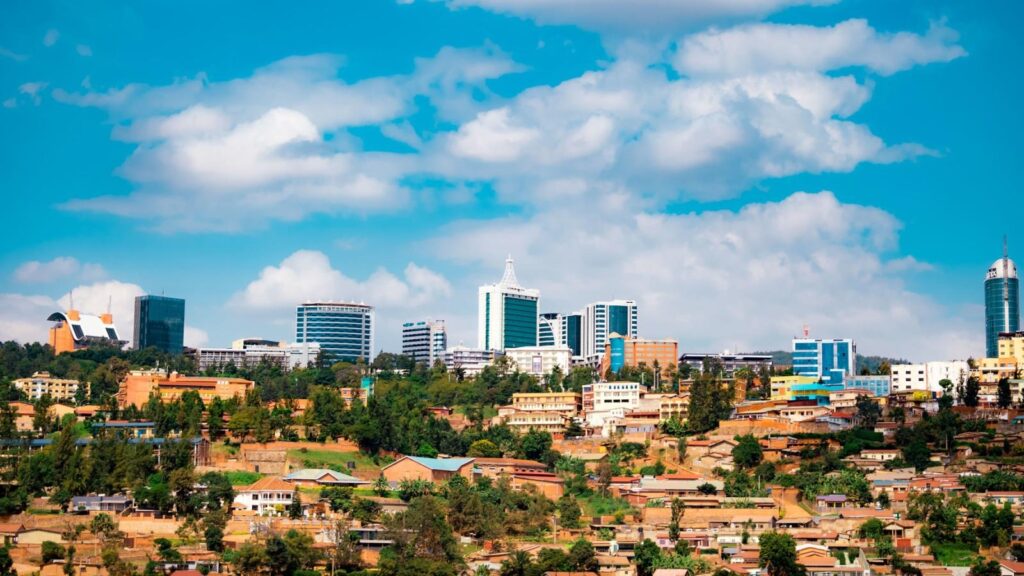Rwanda is ranked Number 2 in Africa for ease of doing business and as a top financial hub, the Kigali International Financial Centre has propelled Rwanda forward.
Rwanda’s transformation from a nation recovering from conflict to a thriving economic hub is nothing short of remarkable.
Today, Rwanda stands out as a beacon of progress in Africa, attracting investors and entrepreneurs. With its business-friendly environment, commitment to sustainability, and a central location that grants access to a vast regional market.
Rwanda’s Thriving Industries: A Beacon of Growth
Rwanda’s economic growth story is fueled by a diverse range of industries, each contributing significantly to the nation’s overall success. Here’s a closer look at some of the sectors leading the charge:
1. Agriculture: The Backbone of the Nation
Agriculture remains the cornerstone of Rwanda’s economy, employing a significant portion of the population (around 70%) and contributing roughly 35% to the GDP.
The fertile volcanic soils and favorable climate make Rwanda ideal for cultivating a variety of crops. Coffee, tea, and pyrethrum (used in insecticides) are major exports, while staple crops like potatoes, beans, and cassava ensure food security for the domestic population.
The government actively promotes sustainable agricultural practices, encouraging innovation and efficiency to maximize yields on limited land.
2. Tourism: Untamed Beauty and Cultural Experiences
Rwanda’s breathtaking landscapes, from the volcanic Virunga Massif to the lush Nyungwe Forest, have positioned it as a premier tourist destination. Visitors flock to witness the awe-inspiring mountain gorillas, a once-in-a-lifetime experience. Beyond wildlife encounters, Rwanda offers a rich cultural tapestry. Tourists can delve into traditional dance performances, explore historic sites, and witness the country’s vibrant art scene. The government’s focus on sustainable tourism ensures a positive impact on local communities and protects the environment.
3. Information and Communication Technology (ICT): A Hub of Innovation
Rwanda is rapidly establishing itself as a leader in Africa’s ICT sector. The government has heavily invested in infrastructure, leading to widespread internet access and a growing tech-savvy population.
This has fostered a thriving startup ecosystem. Young entrepreneurs developing innovative solutions in areas like mobile banking, e-commerce, and education technology.
Rwanda’s commitment to ICT positions it as a hub for innovation, attracting international tech companies seeking a foothold in Africa.
4. Mining and Extractives: Unearthing Rwanda’s Potential
Rwanda is rich in mineral resources, including tin, tungsten, and tantalum, all crucial components in modern electronics. The government prioritizes responsible mining practices, ensuring ethical sourcing and environmental protection.
Rwanda also holds reserves of gold, coltan, and semi-precious stones. As global demand for these minerals rises, the mining sector is poised for further growth, contributing significantly to Rwanda’s economic diversification.
5. Construction: Building a Brighter Future
Rwanda’s rapid urbanization has fueled a boom in the construction industry. The government is heavily invested in infrastructure development, building new roads, bridges, and public buildings.
Additionally, private investors are constructing modern hotels, shopping malls, and residential complexes to meet the growing demand. This surge in construction activity not only creates jobs but also paves the way for further economic development.
Rwanda’s thriving industries are a testament to the nation’s unwavering commitment to progress. By fostering a diverse and dynamic economy, Rwanda is not only securing its own future but also setting an example for sustainable development in Africa.
A Haven for Ease of Doing Business

Rwanda’s reputation precedes it. Ranked second in Africa for ease of doing business by the World Bank, the nation has streamlined bureaucratic processes. Making it remarkably simple to establish and operate a business.
This eliminates the red tape that often discourages potential investors in other parts of the continent.
The establishment of the Kigali International Financial Centre (KIFC) further strengthens Rwanda’s position.
This center, aptly represented by Kigali IFC, provides a world-class infrastructure and regulatory framework specifically designed to attract financial institutions and facilitate cross-border investment.
The KIFC’s impact goes beyond attracting established corporations. It has also been instrumental in fostering a supportive ecosystem for local entrepreneurs. By offering access to funding, mentorship programs, and streamlined business registration, the KIFC empowers Rwandan innovators to turn their ideas into reality. This focus on homegrown talent fuels sustainable economic growth from the ground up.
Driving Foreign Investment
Rwanda’s commitment to creating a business-friendly environment has paid dividends. Foreign Direct Investment (FDI) has seen a steady rise in recent years, with investors recognizing the nation’s potential.
The Rwandan government actively courts foreign investment by offering tax incentives, streamlined visa processes, and a readily available, well-educated workforce.
This targeted approach fosters an environment of collaboration, where international expertise can combine with Rwanda’s domestic drive to create mutually beneficial ventures.
Pioneering Sustainable Practices
Rwanda is not just interested in economic growth; it’s also committed to achieving it sustainably. The nation has emerged as a leader in Africa’s green movement.
The KIFC, for instance, played a pivotal role in developing Rwanda’s National Green Taxonomy, a classification system that directs investment towards environmentally friendly projects. This focus on sustainability is a major draw for environmentally conscious investors seeking to be part of a future-proof economy.
A Gateway to the Region
Rwanda’s strategic location in the heart of Africa offers a significant advantage to businesses. The country serves as a gateway to the East African Community (EAC), the Economic Community of Central African States (ECCAS), and the Common Market for Eastern and Southern Africa (COMESA), representing a combined market of over 600 million people.
Businesses operating in Rwanda can leverage this central location to reach a vast consumer base and tap into diverse regional resources.
A Bright Future for Business
Rwanda’s commitment to fostering a business-friendly environment, coupled with its dedication to sustainable practices and strategic location, positions it for continued economic success.
With the continued development of the KIFC and ongoing government initiatives, Rwanda is well on its way to becoming a premier destination for businesses and investors seeking a foothold in Africa’s burgeoning market.
As Rwanda’s story continues to unfold, one thing is certain: the nation’s rise as a business and investment hub is a testament to its unwavering dedication to progress and a brighter future.
Final Thoughts
Rwanda’s remarkable journey from adversity to prosperity offers valuable lessons for the continent and the world. By prioritizing ease of doing business, responsible development, and fostering a diverse economic landscape, Rwanda has become a magnet for investment and a model for sustainable growth.
As it continues to refine its approach and unlock its full potential, Rwanda’s future as a thriving business hub and a beacon of progress in Africa is assured.





